Enrol now! New 2021 DELE Spanish exam sessions available!
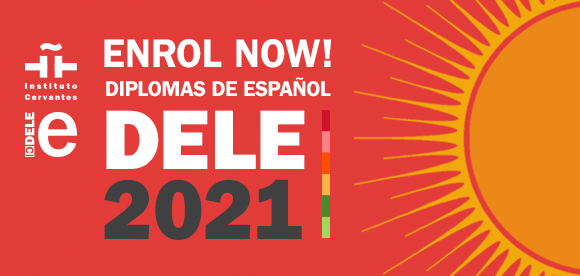
The DELE Spanish Diplomas are official qualifications certifying the degree of competence and mastery of Spanish, granted by Instituto Cervantes on behalf of Ministry of Education and Vocational Training of Spain and, Ministry of Foreign Affairs, European Unión and Cooperation of Spain.
The DELE examinations have been designed following the guidelines of the Common European Framework of Reference for Languages (CEFR) of the Council of Europe.
DELE 2021 exam sessions in May, July, September and November at Instituto Cervantes in London.
- 21 May (written and oral exam). DELE for Young Learners: Levels A1 and A2/B1
Registration deadline: 10 March - 22 May (written exam), 21/22 May (oral exam). Levels: A1, A2, B1, B2, C1, C2*
Registration deadline: 10 March - 9 July (written exam), 9/10 July (oral exam). Levels: A2, B1, B2, C1*
Registration deadline: 5 May - 10 September (written and oral exam). Level: A2
Registration deadline: 7 July - 12 November (written and oral exam): DELE for Young Learners: Levels A1 and A2/B1
Registration deadline: 29 September - 13 November (written exam), 12/13 November (oral exam). Levels: A1, A2, B1, B2, C1, C2*
Registration deadline: 29 September
*Please note that the oral and written exams may not take place on the same day
For more information, visit our website.
“La calidad de la enseñanza es siempre excelente y me sorprende lo duro que trabajan los profesores”
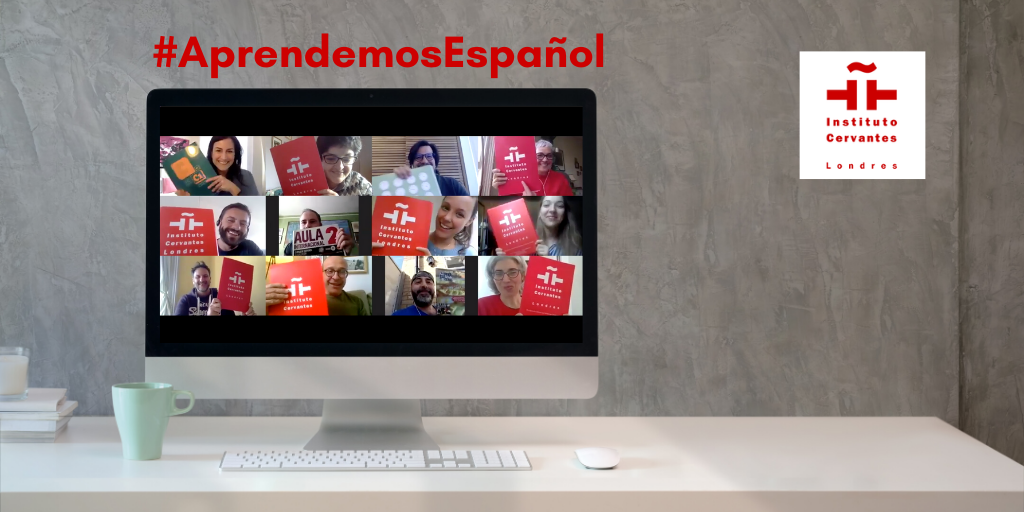
Se acerca el fin de las primeras clases en línea como consecuencia de la alerta sanitaria provocada por el coronavirus COVID-19 y desde el Instituto Cervantes en Londres nos gustaría agradecer a nuestros estudiantes y profesores el esfuerzo y compromiso mantenido desde que se suspendieran las clases de grupo presenciales el pasado 17 de marzo.
Más de 250 alumnos nos han dado su retroalimentación en una encuesta anónima sobre su experiencia aprendiendo español en línea, en la que la mayoría destacan que la calidad de la enseñanza del Instituto Cervantes de Londres: “Siempre es excelente y me sorprende lo duro que trabajan los profesores para garantizar que las clases se mantengan interesantes”.
El director del Instituto Cervantes de Londres, Ignacio Peyró, agradece la confianza depositada por los estudiantes y el esfuerzo llevado a cabo por los profesores: “Es un orgullo trabajar con este equipo y ser respondido con tan buena acogida. Ante una situación tan incierta, hemos intentado que los cambios de forma no repercutan en la calidad de la enseñanza”.
Han sido semanas de aprendizaje mutuo en las que los estudiantes del Instituto Cervantes han respondido con los brazos abiertos a nuestra propuesta en línea para seguir mejorando su español y su conocimiento. De hecho, otro de los estudiantes enfatiza que superó sus expectativas: “tanto la profesora al final del último trimestre, como el actual, han sido increíbles con la tecnología”.
Los profesores, en palabras del jefe de estudios, Pablo Martínez Gila, están «sorprendidos de la facilidad que han mostrado los estudiantes para adaptarse al nuevo contexto de aprendizaje y del esfuerzo enorme que están haciendo para mantener el mismo nivel de interacción en la clase y de trabajo autónomo en casa. Los resultados están siendo mucho mejor de lo que se podía esperar cuando empezamos a emplear herramientas virtuales de aprendizaje».
Por otro lado, el jefe de estudios destaca como un aspecto clave «el trabajo de formación colaborativa que ha habido entre los profesores del centro, que están permanentemente compartiendo experiencias y buenas prácticas de enseñanza de español en línea».
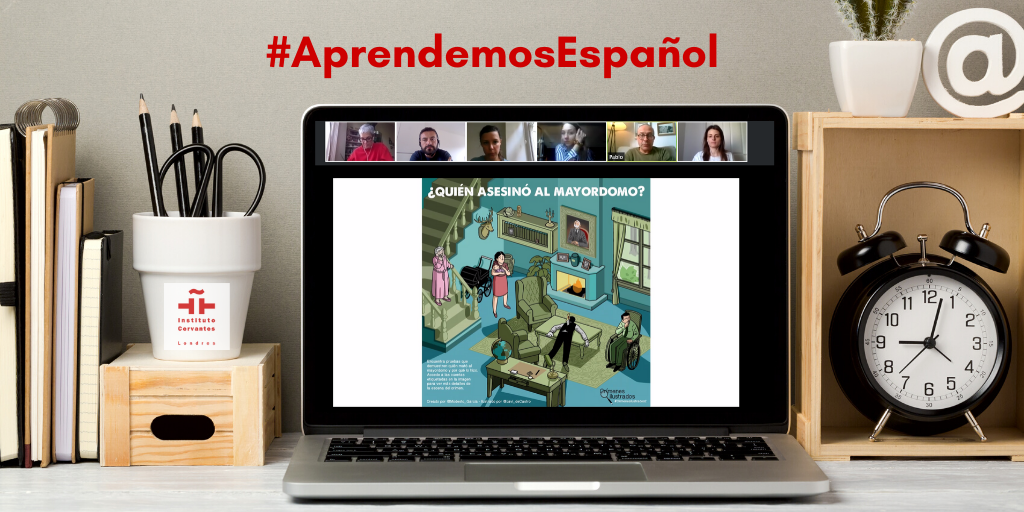
Por su parte, otro alumno destaca como le gusta mucho “el formato y la forma en que funciona el curso”. En su caso, tiene hijos pequeños y vive lejos de Londres, por lo que las clases en línea le permiten “trabajar a mi propio ritmo y cuando tengo tiempo” y apuesta porque se sigan ofreciendo estos cursos en línea.
“Estoy muy contento con las directrices del profesor, las plataformas en línea que utilizamos están funcionando muy bien para mí y todo está muy bien organizado. Estoy muy impresionado con lo rápido y lo bien que el Instituto Cervantes de Londres organizó los cursos en línea y cómo mi profesor prepara cada lección. Es brillante, gracias a todos”, añade otro.
Nuevo curso: «Cómo preparar clases a distancia»
Este curso de formación de profesores de español proporciona el desarrollo de la competencia digital y las estrategias necesarias para planificar y dinamizar tanto las clases en línea como presenciales.
Próximas fechas
Martes, del 9 de junio al 7 de julio, de 16.00 a 18.00 horas
Más información
Visita nuestra web o escribe un correo electrónico a cenlon@cervantes.es.
«I am enormously grateful to all at Instituto Cervantes London who conspired to get me over the finish line»
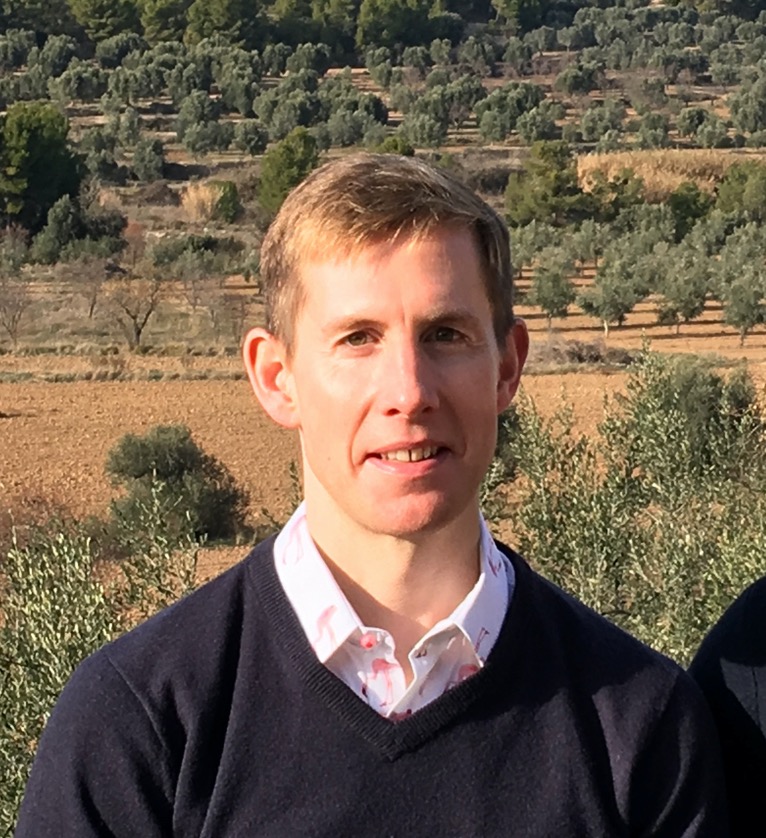
Today we chat with one of our students, Joseph McGowan, who just passed DELE C2 exam and previously achieved DELE C1. Joseph has studied Spanish at Instituto Cervantes in London for a long time and he prepared himself for this exam with our teachers. He enjoys learning Spanish every week and travelling to the beautiful Catalonian town of Sitges.
¿Why did you decide to take DELE exam?
I decided to take the DELE exam, not out of any academic, professional or administrative necessity, but simply as a personal challenge. I wanted to learn Spanish, but I knew I had to have a deadline, otherwise I’d pootle along aimlessly. Procrastination is an art form I’ve mastered, so I needed some impetus to turn the desire to learn into a reality. Also, with years of unstructured learning of French under my belt, I knew that the vague target of «I want to speak a language» can be like trying to reach the end of the rainbow: you never quite get there; there’s always a bit further to go. The feeling you can speak a language successfully comes and goes like the weather, depending on mood, physical state, subject-matter, interlocutor, etc. So I wanted an objective and solid milestone by which to measure my progress.-
How was the preparation? What was the most difficult part for you?
Without doubt, the writing was the most difficult element. I was a terrible schoolboy, never did my homework, didn’t take any further exams after my GCSEs, so once again being faced with The Demon Blank Sheet of Paper waiting to be filled was not only an academic but also a psychological barrier to break through. Fortunately I had a fantastic teacher who was extremely patient and generous with her time and effort. She offered to be my sherpa to guide me up the mountain to the exam. And that mountain certainly did seem steep, and rocky. But once I got there, it was amazing to look back and see how far I’d come.
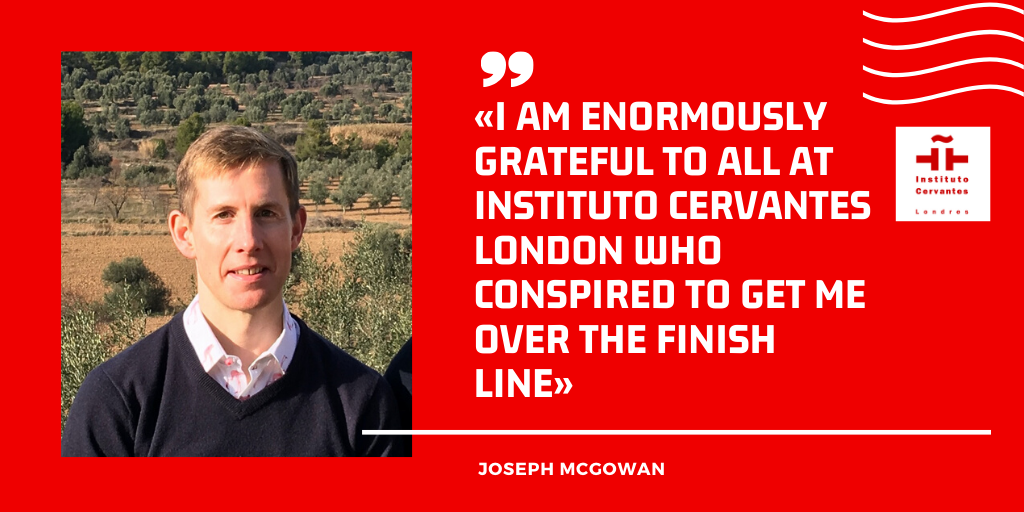
How did the DELE preparation classes at Instituto Cervantes London help you?
As you’ll have gathered, for me the classes were indispensable. Left to my own devices, I could never have passed the C1 and C2 exams. At an advanced level, even in their native tongue, I think someone would struggle to pass a CEFR language exam without preparation. You have to know the format of the exam; for the writing, there are models of text you may not be familiar with; and learning to manage the time in the exam is essential and, at least to me, did not come naturally. My teacher carefully planned each class so there was a progression, which stopped me spending too much time on one particular element at the expense of another. She was there to remind me that you only have to be good enough to pass the exam, there’s no point in trying to exceed the requirements. Of course, perfection is the enemy of good, but it’s sometimes hard to judge alone. In the moments when my determination wobbled and I thought, «Why am I putting myself through this?», I knew I couldn’t let her down and back out now, after we’d both invested so much time and effort.
Looking back, the fact I embarked upon this journey in my 40th year probably isn’t a coincidence. At a time of taking stock of one’s life, it’s not a bad way to live out a mid-life crisis! I am enormously grateful to all at Instituto Cervantes London who conspired to get me over the finish line (twice). The journey is not over, of course — I am now working on Spanish literature with my teacher — but I am very pleased, even proud, to have put those two important milestones behind me.
If you want to take a DELE exam, you can enrol through the online shop of Instituto Cervantes London (CLIC Londres).
These are the upcoming exam sessions at Instituto Cervantes London:
- 11 September (written and oral exam), DELE for Young Learners: Levels A1 and A2/B1
Enrolment deadline 15 July - 11 September (written exam), 11/12 September (oral exam). Level A1, A2, B1, B2, C1, C2
Enrolment deadline 15 July - 13 November (written and oral exam), DELE for Young Learners: Levels A1 and A2/B1
Enrolment deadline 7 October - 14 November (written exam), 13/14 November (oral exam). Levels: A1, A2, B1, B2, C1, C2
Enrolment deadline 7 October
We are here for you! ¡Estamos contigo!
We all have to #StayAtHome but #InstitutoCervantesContigo keeps looking after their students, and now, more than ever, they are learning #Spanish with their teachers, using the online tools in a new and fun way.
We are here for you!
Todos tenemos que seguir el consejo #QuédateEnCasa pero #InstitutoCervantesContigo sigue cuidando a sus alumnos. Ahora, más que nunca, están aprendiendo español con sus profesores, utilizando las herramientas en línea de una manera nueva y divertida.
¡Estamos contigo!
Important notice: classroom based group lessons transferred to online mode and suspension of the cultural activity of Instituto Cervantes in the United Kingdom
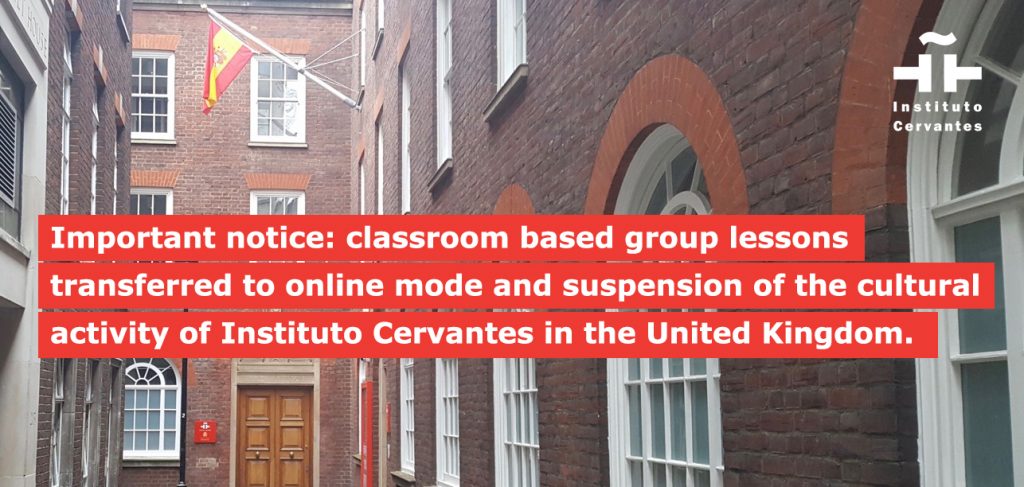
Due to the health alert caused by coronavirus COVID-19, Instituto Cervantes in the United Kingdom, following British and Spanish authorities’ guidelines, has decided, in order to protect the health of all involved, to transfer its classroom based group lessons to online platforms and to suspend its cultural programme in the centers of London, Manchester and Leeds until further notice.
Please kindly check Instituto Cervantes in Manchester and Leeds’ websites for further details and announcements.
MEASURES FOR LONDON:
Academic activity: classroom based group lessons are suspended from Tuesday, March 17th. We will start teaching our classes remotely from Friday, March 20th.
Tuesday, March 17th, Wednesday, March 18th and Thursday, March 19th there will be NO group based class of any kind and these sessions will be moved at the end the course timetable.
The teacher in charge of each group will contact their students as soon as possible to give them precise details about the implementation of the classes on line, and about the recovery of 17th, 18th, and 19th on March sessions, when applicable.
We will continue to teach our classes remotely until the end of the present term.
- The Spanish AVE Global on-line courses, as well as the rest of the Instituto Cervantes’ on-line teacher training, are still in operation.
- The CCSE exam scheduled for March 26th in London goes ahead
- DELE exams in May are suspended. Students who registered will be contacted by Instituto Cervantes to reschedule their exam to July or September.
- All the scheduled cultural activities are postponed
- Our libraries will remain closed and the deadline for returns of any borrowed items will be extended accordingly. All the services of our electronic library will remain available. You may find additional information on the YouTube channel of each center (London, Manchester, and Leeds).
Please follow us here as well as on our website and our social networks for further updates of the situation and notification of the normalization of our activities.
For any questions or additional information, you can contact us via email in London (cenlon@cervantes.es), Manchester (cenman@cervantes.es) and Leeds (cenlee@cervantes.es).
Instituto Cervantes will continue to collaborate with authorities by conveying our plans and data and following the recommendations given in order to limit the spread of the COVID-2019 coronavirus.
Instituto Cervantes en Reino Unido: Aviso importante sobre clases ‘online’, exámenes oficiales y actividad cultural
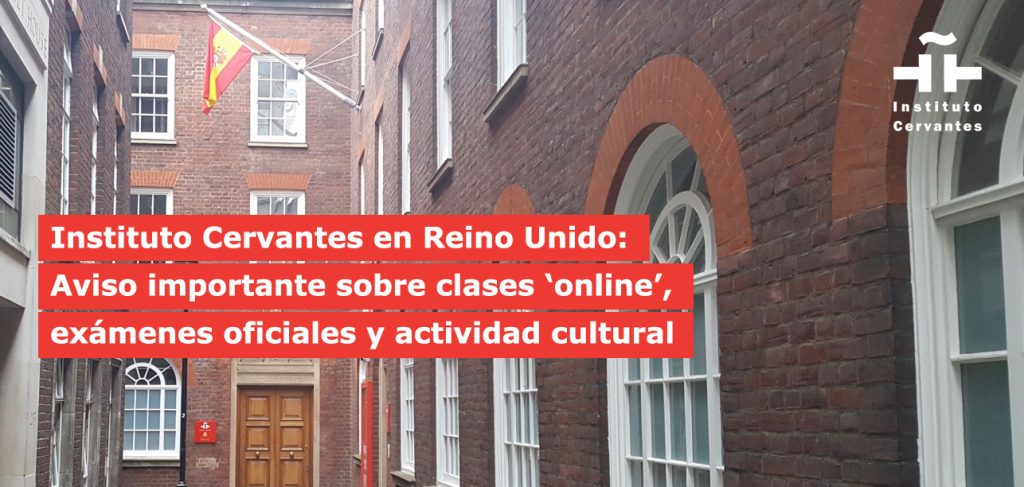
Ante la alerta sanitaria provocada por el coronavirus COVID-19, el Instituto Cervantes en Reino Unido, siguiendo las directrices de las autoridades británicas y españolas, ha decidido, con el fin de proteger la salud de todos, la transferencia de sus clases presenciales a la formación en línea y la suspensión de su programación cultural. Estas medidas afectan a los centros de Londres, Mánchester y Leeds hasta nuevo aviso.
Por favor, consulte las webs del Instituto Cervantes en Manchester y Leeds para saber más detalles y leer más avisos.
MEDIDAS PARA LONDRES
- En el ámbito académico, las clases de grupo presenciales quedan suspendidas desde el martes 17 de marzo en el centro de Londres. Continuaremos impartiendo nuestras clases a distancia a partir del viernes 20 de marzo. El martes 17, miércoles 18 y jueves 19 NO habrá clases ni presenciales ni en línea y se recuperarán al final de cada curso.
El profesor encargado de cada grupo contactará a la mayor brevedad con sus estudiantes para darles detalles precisos sobre la puesta en marcha de las clases por vía telemática y sobre la recuperación de las clases no impartidas los días 17, 18 y 19.
Los cursos de español a través de Internet Ave Global, así como el resto de la formación en línea del Instituto Cervantes, siguen operativos.
El examen CCSE programado para el día 26 de marzo en el centro de Londres sigue en pie.
Los exámenes DELE de mayo quedan suspendidos. A los alumnos inscritos se les contactará desde el centro para reagendar su examen para las convocatorias de julio o septiembre.
- Las actividades culturales programadas quedan aplazadas
- Nuestras bibliotecas permanecerán cerradas, prorrogándose todos los préstamos actuales durante el tiempo de cierre. Se seguirán manteniendo todos los servicios de nuestra biblioteca electrónica. Sugerimos asimismo consultar el canal de Youtube de cada centro (Londres, Mánchester, Leeds).
Rogamos seguir con atención todas las comunicaciones realizadas por este medio, así como las publicaciones de nuestro portal y de nuestras redes sociales, pues iremos informando puntualmente de la evolución de la situación, y avisaremos también a través de ellos de la normalización de nuestras actividades.
Para cualquier consulta o información adicional, se puede contactar con nosotros a través de los correos electrónicos de Londres (cenlon@cervantes.es), Mánchester (cenman@cervantes.es) and Leeds (cenlee@cervantes.es).
En el Instituto Cervantes seguiremos prestando la máxima colaboración a las autoridades y llevando a cabo, con el mayor esmero y la mayor celeridad posibles, cuantas recomendaciones se indiquen con el fin de evitar la propagación del coronavirus COVID-2019.
STATEMENT BY INSTITUTO CERVANTES IN THE UK ON COVID-19 (CORONAVIRUS)
In light of the recent health alerts regarding the Coronavirus, we would like to assure you that the centres of the Instituto Cervantes in UK (Leeds, London and Manchester) remain open, with courses and events continuing as usual. We are keeping track of any new information or advice from Public Health England, the NHS and UK Government on the matter and will adopt any recommendations accordingly. Likewise, we urge the responsibility of our students to follow the hygiene measures and indications recommended by the British health authorities:
Furthermore, due to the risk of spread of the COVID-19 virus, it is requested by both the UK and Spanish health authorities that any person who has recently travelled to China (mainland China, Hong Kong, Macao), Singapore, South Korea, Iran or Italy shall self-isolate themselves at home for a period of 14 days on their return. This applies as well to any person who has been in close contact with a confirmed case of coronavirus.
If any of the abovementioned situations apply to you, we would be grateful if you could inform us. We will then alert the HSE and follow their recommendations on risk assessment. We will implement any measures and treat any specific case following the advice of the appropriate authorities.
The health and wellbeing of our staff and students remains our top priority and we will continue monitoring the situation and acting upon the information made available to us by the HSE.
COMUNICADO DEL INSTITUTO CERVANTES DEL REINO UNIDO SOBRE COVID-19 (CORONAVIRUS)
Ante la situación creada por la alerta sanitaria debida al Coronavirus, los Institutos Cervantes del Reino Unido (Leeds, Londres y Mánchester) comunican que los centros continúan abiertos y ofrecen sus cursos y sus actividades culturales programadas. Estamos pendientes de cualquier nueva información o medida que Public Health England, el NHS o el Gobierno de Reino Unido comuniquen al respecto con el fin de adoptar sus recomendaciones. Igualmente, instamos a la responsabilidad de nuestros alumnos para que sigan las medidas de higiene e indicaciones recomendadas por las autoridades sanitarias británicas:
Por otro lado, debido al riesgo de propagación del virus COVID-19, tanto las autoridades sanitarias del Reino Unido como las españolas solicitan que cualquier persona que haya viajado recientemente a China (China continental, Hong Kong, Macao), Singapur, Corea del Sur, Irán o Italia se aísle en casa por un período de 14 días a su regreso. Esto se aplica también a cualquier persona que haya estado en contacto cercano con un caso confirmado de coronavirus.
Si usted está en alguna de las situaciones mencionadas anteriormente, le agradeceríamos que nos informara cuanto antes. El Instituto dará parte al HSE y seguiremos sus recomendaciones sobre la evaluación de riesgos. Implementaremos cualquier medida y trataremos cualquier caso específico siguiendo el consejo de las autoridades correspondientes.
La salud y el bienestar de nuestros estudiantes y nuestro personal ha sido y sigue siendo nuestra prioridad principal y continuaremos monitorizando la situación y actuando de acuerdo con la información que HSE pone a nuestra disposición.
Instituto Cervantes comes to Scotland

The director of Instituto Cervantes, Luis García Montero, and the head of the Spanish Department of the University of Aberdeen (Scotland, United Kingdom), Jesse Barker, signed an agreement for academic and cultural cooperation that makes the university an official examination centre for the Spanish Diploma (DELE) administered by Cervantes.
The signed agreement integrates the School of Language, Literature, Music and Visual Culture of the University of Aberdeen into the network of Instituto Cervantes’ examination centres in the United Kingdom. The first exams will be held next May with the support of Instituto Cervantes in Manchester (England), the centre to which the agreement is attached.
With the agreement signed in the third most important city in Scotland, the presence of Instituto Cervantes in the north of Great Britain is being reinforced, with the aim of meeting the growing interest of British students to obtain the DELE diploma and internationally recognised certification of a command of Spanish.
The University of Aberdeen joins three other Scottish educational centers that hold DELE exams: the University of Strathclyde (Glasgow), the Edinburgh College (Sighthill Campus) and SALT Edinburgh: Academy of Language and Translation in Edinburgh. The number of candidates in Scotland increased by 60% in 2019 compared to the previous year, and a similar growth is expected in 2020.
«Spanish Ambassadors»
The presence of Instituto Cervantes in the north of the United Kingdom, and in Scotland in particular, has been reinforced in recent years. This is attributable to the joint planning of cultural activities with Scottish universities from the centre of Manchester with a focus on history, art, literature and cinema. The Spanish cultural offer includes the launch of the «Luis Buñuel Film Club» at the universities of Aberdeen and Strachclyde (Glasgow) and the «Spanish Ambassadors» programme, aimed at young university students interested in spreading the Spanish language and the Spanish-speaking culture.
García Montero has also met with the heads of the Spanish departments of four other Scottish universities (Edinburgh, Dundee, Strachclyde and Saint Andrews) og which he thanked for their work in promoting Spanish whilst also encouraging them to propose initiatives that increase the Students’ interest in the Hispanic world. The Spanish Consul General in Edinburgh, Ignacio Cartagena Núñez, and the director of the Cervantes Institute in Manchester, Francisco Oda-Ángel, participated.
On the invitation of the Lawyers Without Borders Students Association of the University of Aberdeen, Luis García Montero also participated in the VI Annual Human Rights Congress, whose central theme revolved around the freedom of artists in the promotion of fundamental rights.


